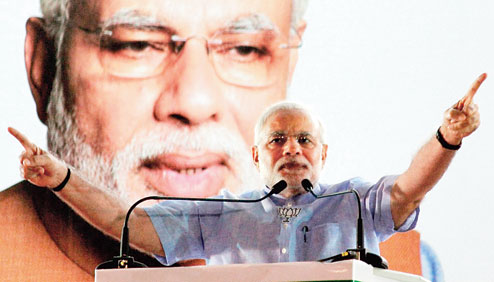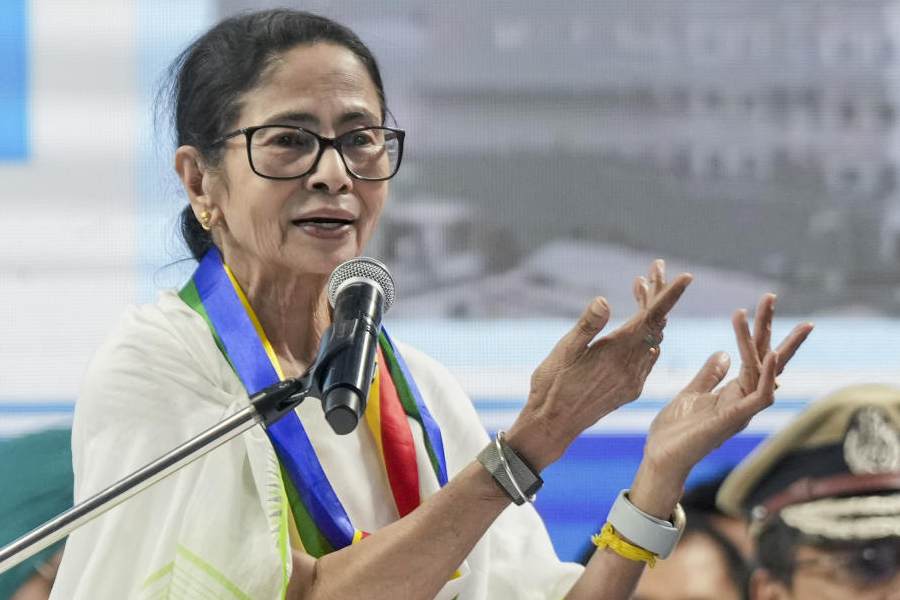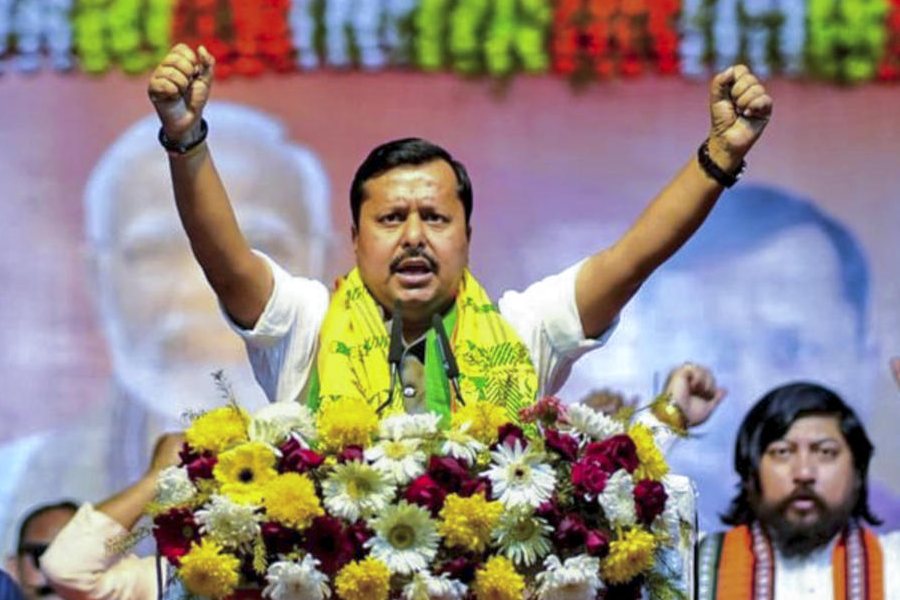 |
| Prime Minister Narendra Modi addresses an election rally in Nagpur on Tuesday. (PTI) |
Nagpur, Oct. 7: The party that swore by Ram is now banking on “Vibhishans” in Maharashtra.
Sanjay Deotale, cultural affairs minister in Prithviraj Chavan’s just-dissolved ministry, needed just half a day to switch loyalties after the Congress denied him a poll ticket. The BJP took just minutes to accommodate him by dumping a long-time loyalist.
But the BJP hasn’t been alone in enticing and embracing renegades. Deotale was just one wave in a flood of defections across Maharashtra on the last day for nominations, September 27, triggered by the break-up of the state’s two longstanding political alliances two days earlier.
With no party possessing strong candidates for all the 288 constituencies, a last-minute scramble for turncoats began.
Warora constituency, which Deotale had won four times, was in the Shiv Sena’s quota. When the alliance broke, the BJP went hunting for candidates in erstwhile Sena bastions. In Thane, at least 10 Sena leaders switched to the BJP.
A couple of hours before the filing of nominations ended, Deotale joined the BJP to contest against the Congress candidate, his sister-in-law Asawari Deotale.
The BJP’s original choice, Omprakash Mandavkar, had already reached the returning officer’s chamber and was about to file his nomination when the party ordered him to stop.
A while later, BJP workers were aghast to learn that the party was fielding a man they had been fighting for more than two decades.
An indignant Mandavkar decided to go ahead and finish the formalities, except that he would now contest on a Maharashtra Navnirman Sena ticket. Six other BJP aspirants filed their nominations as rebels from Warora.
Local Congress and BJP workers in Warora seemed too dazed to react to the fast-moving developments. Deotale had contested the Lok Sabha polls just months earlier on a Congress ticket from Chandrapur-Yavatmal and lost to the BJP’s Hansraj Ahir.
Ahir is now trying to persuade local party and Sangh cadres to campaign for the newcomer, and asking the rebels to withdraw their nominations in the party’s interests. Deotale is a formidable candidate and that’s the only thing that matters, says the BJP.
Deotale’s desertion has shocked many in his former party. But hardly any constituency exists in the state where no candidate has switched loyalties.
Pa of poaching
Amit Shah’s BJP has been the biggest poacher. The party started well ahead of the elections, welcoming defectors from all directions over the past few months, till the trickle turned into a torrent after its split from its ally of 25 years.
Of the 257 BJP candidates — the remaining 31 have been left for the four smaller allies — about 100 are defectors. Of them, at least 40 were picked up between September 25 and 27 to contest in constituencies where the party has no prominent faces and hardly any organisation.
At a news conference, state BJP state president Devendra Fadnavis was asked why his party had to “borrow” so many candidates, including some from a Chavan cabinet the BJP had accused of corruption.
“Ram needed a Vibhishan (Ravan’s brother who switched sides) to raze Lanka,” Fadnavis said. “These newcomers are the Vibhishans we need to burn the Congress-NCP Lanka.”
Most of the “newcomers” have huge business interests. Most have been fielded from constituencies the Sena contested when the alliance was intact. But the other parties are playing the game too.
The NCP, which saw huge desertions in the past six months, has been welcoming Congress and Shiv Sena rejects; the Shiv Sena has poached from the NCP and the Congress; The Maharashtra Navnirman Sena has fielded Shiv Sena deserters.
If the Congress has trailed the rest somewhat in stealing candidates, that’s because its main problem has been the large number of ticket hopefuls within its ranks.
The rebels turned “Independents” have compounded the battle, leaving voters confused and, perhaps for the first time, blurring political identities and ideologies in the state.
Gadkari model
The defections were “an inevitable outcome of the fractured body politic in Maharashtra, and were engineered by the BJP to acquire power”, said Pune-based political analyst Kumar Saptarshi, a Janata Party MLA in the late 1970s who has long retired from active politics.
The BJP’s strategy is a scaling-up of the Nitin Gadkari model that has been in play for almost a decade in Nagpur district.
Gadkari built his team with foot soldiers “borrowed” from the Congress to battle the rival’s hegemony, at times sidelining BJP old-timers. In the last few years, he has replicated the model across Vidarbha.
For instance, the BJP’s Gondia-Bhandara MP, Nana Patole, is a staunch Congressman turned staunch Gadkari aide. The BJP’s West Nagpur MLA, Sudhakar Deshmukh, is a former Congress district president.
Deshmukh’s mentor Datta Meghe, a former Pawar loyalist and ex-Congress MP from Wardha, joined the BJP with sons Sagar and Samir (now BJP candidate from Hingna) two months ago. The list is endless.
NCP flood
Most of the BJP’s “newcomers” are pitted against Congress candidates. The NCP alone has lost 30-odd regional satraps — former ministers and sitting or aspiring MLAs — to the BJP in constituencies where the Congress is strong.
Most of the defectors from the NCP were people close to Sharad Pawar who did not gel with his nephew Ajit Pawar.
In the run-up to the Lok Sabha polls, the Congress had accused the NCP of “lending” three candidates to the BJP and one to the Shiv Sena to fight the Congress in its strongholds of Nandurbar, Sangli, Bhiwandi and Sindhudurg.
Compounding the Congress’s suspicions, the BJP and the Shiv Sena did not field their candidates against the NCP in four constituencies: Baramati, Madha, Satara and Kolhapur. The alliance left those seats to its smaller partners, and the NCP won all four.
An NCP leader said on the condition of anonymity that Sharad Pawar was teaching his nephew a political lesson and ensuring that his aides were with the BJP to safeguard his wide-ranging business interests.
Pawar not only shares a good rapport with Gadkari and other BJP leaders but also has common business interests and industry friends.











